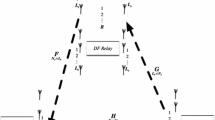Abstract
An adaptive decode-and-forward (DF) cooperative diversity system based on quadrature modulation is proposed, in which each user is allowed to transmit its own and the partner’s data simultaneously via the in-phase and quadrature components of M-ary quadrature amplitude modulation (MQAM) constellation. Cooperative transmission in this way can avoid the bandwidth expansion in traditional cooperative systems. The closed form expression of the average bit error rate (BER) performance is derived in terms of the interuser and uplink channel statistics and a scalable power allocation factor, and further verified by simulations. Then the effect of equal power allocation (EPA) and optimal power allocation (OPA) algorithms on the system performance and the best partner location for a given user are investigated. Simulations show that the OPA algorithm offers considerable gains over EPA algorithm under practical non-ideal cooperative scenarios, and by joint consideration of partner selection and OPA, a simple yet near-optimal partner selection heuristic is achieved.
Similar content being viewed by others
Explore related subjects
Discover the latest articles and news from researchers in related subjects, suggested using machine learning.References
Foschini G J, Gans M J. On limits of wireless communications in a fading environment when using multiple antennas. Wirel Pers Commun, 1998, 6: 311–335
Laneman J N, Tse D N C, Wornell G W. Cooperative diversity in wireless networks: efficient protocols and outage behavior. IEEE Trans Inf Theory, 2004, 50: 3062–3080
Nosratina A, Hunter T E, Hedayat A. Cooperative communication in wireless networks. IEEE Commun Mag, 2004, 42: 68–73
Hunter T E, Nosratina A. Diversity through coded cooperation. IEEE Trans Inf Theory, 2006, 5: 283–289
Li J, Ge J H, Wang Y, et al. A bandwidth efficient two-user cooperative diversity system with limited feedback. Sci China Ser F-Inf Sci, 2009, 52: 1055–1066
Xiao L, Fuja T E, Kliewer J, et al. A network coding approach to cooperative diversity. IEEE Trans Inf Theory, 2007, 53: 3714–3722
Larsson E G, Vojcic B R. Cooperative transmit diversity based on superposition modulation. IEEE Commun Lett, 2005, 9: 778–780
Mahinthan V, Mark J W, Shen X S. A cooperative diversity scheme based on quadrature signaling. IEEE Trans Wirel Commun, 2007 6: 41–45
Luo J, Blun R S, Cimini L J, et al. Decode-and-forward cooperative diversity with power allocation in wireless networks. IEEE Trans Wirel Commun, 2007, 6: 793–799
Chris T K N, Andrea J G. The impact of CSI and power allocation on relay channel capacity and cooperation strategies. IEEE Trans Wirel Commun, 2008, 7: 5380–5389
Zhang Y, Xu Y Y, Cai Y M. Power allocation for non-orthogonal decode-and-forward cooperation protocol. Sci China Ser F-Inf Sci, 2009, 52: 1037–1042
Lee Y M, Tsai M H, Sou S I. Performance of decode-and-forward cooperation communications with multiple dual-hop relays over Nakagami-m fading channels. IEEE Trans Wirel Commun, 2009, 8: 2853–2859
Li L, Hu H L, Chen X, et al. Adaptive cooperative coding with power allocation in wireless relay networks. IEEE Trans Wirel Commun, 2009, 8: 4604–4615
Lin Z, Erkip E, Stefanov A. Cooperative regions and partner choice in coded cooperative systems. IEEE Trans Commun, 2006, 54: 1323–1334
Nosratinia A, Hunter T E. Grouping and partner selection in cooperative wireless networks. IEEE J Select Areas Commun, 2007, 25: 369–378
Simic L, Berber S M, Sowerby K W. Partner choice and power allocation for energy efficient cooperation in wireless sensor networks. In: Proc IEEE ICC, Beijing, China, 2008. 4255–4260
Bletas A, Shin H, Win M Z. Cooperative communications with outage optimal opportunistic relaying. IEEE Trans Wirel Commun, 2007, 6: 3450–3460
Ibrahim A S, Sadek A K, Su W F, et al. Cooperative communications with relay-selection: when to cooperate and whom to cooperate with? IEEE Trans Wirel Commun, 2008, 7: 2814–2827
Proakis J G. Digital Communications. 4th ed. New York: McGraw-Hill, 2003
Chen B L. Theory and algorithms of Optimization (in Chinese). 2nd ed. Beijing: Tsinghua University Press, 2005
Zhou Q F, Lau F C M. Two incremental relaying protocols for cooperative networks. IET Commun, 2008, 2: 1272–1278
Loskot P, Beaulieu C N. Average error rate evaluation of digital modulations in slow fading by prony approximation. In: Proc IEEE ICC, Paris, France, 2004. 3353–3357
Author information
Authors and Affiliations
Corresponding author
Rights and permissions
About this article
Cite this article
Li, J., Ge, J., Wang, Y. et al. Performance analysis and partner selection for cooperative diversity based on MQAM modulation. Sci. China Inf. Sci. 53, 1044–1055 (2010). https://doi.org/10.1007/s11432-010-0081-1
Received:
Accepted:
Published:
Issue Date:
DOI: https://doi.org/10.1007/s11432-010-0081-1




